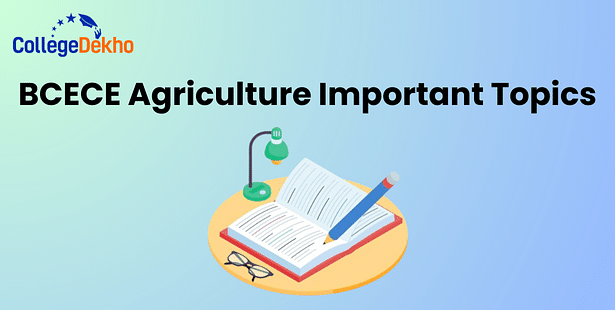This article provides important topics for Agriculture, their weightage, preparation tips, and recommended books to help you study.

The BCECE 2025 exam is expected to be held in the first week of July 2025 in offline mode. The Bihar Combined Entrance Competitive Examination Board will release the BCECE application form in May 2025 tentatively.
The duration of the exam is 4 hours and 30 minutes. BCECE stands for Bihar Combined Entrance Competitive Exam. The subjects included for BCECE 2025 are Physics, Chemistry, Mathematics, Biology and Agriculture.
Students can opt for either of the subject combinations – PCM, PCB, MBA, MCA, CBA, or PCMB. Each section consists of 100 questions. For every correct answer, 4 marks are given and there is a negative marking of 1 mark for every wrong answer.
Also Read: BCECE 2025 Admit Card 2025
BCECE Agriculture Syllabus PDF Download
The BCECE 2025 syllabus for Agriculture outlines the key topics that will be covered in the exam. This syllabus is published each year by the Bihar Combined Entrance Competitive Examination Board (BCECEB) in an official brochure. To achieve a good result in the BCECE Agriculture 2025 exam, students should review the syllabus carefully.
BCECE Agriculture 2025 Syllabus PDF Download |
|---|
The BCECE 2025 syllabus covers topics from classes 11 and 12. If you plan to take the exam this year, start by downloading and reviewing the BCECE Agriculture 2025 syllabus PDF. This will help you prepare effectively.
BCECE 2025 Agriculture Syllabus
There are various topics to be covered under the BCECE Agriculture syllabus. The agriculture topics and sub-topics are being mentioned here.
Introductory Agriculture and Agro meteorology
- Definition of Agriculture, Brief History of Agriculture.
- Disciplines of Agriculture: Agronomy, Soil Science, Plant breeding and genetics, Horticulture, Entomology, Plant Pathology, Extension education, Agricultural economics, Agricultural Engineering, Agricultural statistics ( One paragraph description on each discipline)
- National and International agricultural institutes in India.
- Agro-climatic Zones of India and Bihar.
- Elements of Weather-rainfall, temperature, humidity, wind velocity, sunshine, weather forecasting' Climate change about crop production.
- Tillage: Definition, Objective and types of tillage.
- Tillage implements (primary, secondary and inter tillage).
- Soil tilth, its importance and its effect on soil properties.
- Tillage practices (conventional) vs. conservation and zero tillage).
- Methods of sowing/planting, Depth of sowing, transplanting and harvesting.
Soil as A Medium Of Plant Growth
- Soil is a natural three-dimensional resource.
- Soil classification, major soils of India/ Bihar.
- Soil profile, soil texture and structure, Soil Organism, Soil reaction / pH.
- Soil water.
- Soil fertility & productivity and their indicators.
- Essential plant nutrients, their functions and deficiency symptoms.
- Sufficiency and toxic levels of nutrients.
- Fertilizers, manures, bio-=fertilizers, integrated nutrient management.
- Fertilizer placement, top dressing ad foliar application.
Plant Breeding and Genetics
- Mendel's Laws of inheritance and its exception and significance.
- Qualitative and quantitative traits and their inheritance.
- Plant Breeding: Definition, history, objective and its achievements.
- Heterosis, its basis and exploitation.
- Breeding methods for crop improvement:- Introduction, selection, hybridization, mutation, polyploidy, population improvement.
- Recent methods of crop improvement, plant biotechnology and genetic engineering.
- Plant Genetic Resources: their collection, conservation and utilization.
- Seed: Formation, classification and multiplication.
- Intellectual Property Right: Definition, Classification and its importance.
Agricultural Engineering
- Agricultural Implements:- cultivators, M.B. plough, Disc, Zero till seed drill, Rotavator, Power tiller, Tractor, Harvester - Engine- I.C. Engine: parts of engine and their work. Working of I.C. Engine, Working of 2 and 4 stroke engines. Difference between 2 stroke and 4 stroke engine, Difference between diesel and petrol engine, problems and troubleshooting of engine, Maintenance of engine, Maintenance after 100 hours and Maintenance after 500 hours.
- Electric motor: D.C. and A.C. 3 phase induction motor, single phase induction motor, Types of motor, Capacitor, Selection of electric motor.
- Sowing: Method of seeding or sowing, Seed-cum-fertilizer drill, Calibration of seed drill machine, thresher- its working and maintenance, winnower.
- Harvesting Equipment, working principle of mower, Problems and maintenance of harvesting equipments.
Crop protection
- Importance of crop insect-pests, diseases, nematodes, rodents.
- Important insect-pest and diseases of field crops, vegetables, fruits and stored grain pests and their management.
- Methods of control of insect-pest and disease:- Physical, Mechanical, Cultural, biological, chemical, autocidal, legal method and integrated pest management.
- Pesticides and their classification, symptoms of poisoning, First aid and antidotes.
- Harmful effects of insecticides.
- Effect of environment (temperature, moisture, wind, light, soil pH) on pest development.
Animal Husbandry, Dairy and Fish Production
- Importance of livestock in agriculture & industry
- Important developmental programmes by the Central or State Government for the improvement of livestock ( Operation Flood)
- Important indigenous and exotic breeds of Cattle, buffalo, sheep, goat & poultry.
- System of housing in cattle & poultry. - Principles of feeding. - Management of cattle at the time of
- calving (ii) newborn calf (iii) heifers (iv) milch animals (v) pregnant animals and poultry (vi) Bullocks (Chicks pullets, Layers, Broilers) - Principles of feeding of different classes of animals, calves, pregnant animals, lactating animals, Bullocks and Poultry (Chicks, Pullets, Layers & Broilers)
- Methods of conservation of green fodder (haymaking & silage making)
- Sign of sick & healthy animals, aetiology symptoms, prevention and control of common diseases in cattle & poultry. (i) Rinderpest (ii) Foot & mouth disease (iii) Rabies (iv) Haemorrhagic Septicaemia (v) Black quarter (vi) Mastitis (Vii) Trypanosomiasis (viii) Basesiosis (ix) Coccidiosis (x) Ranikhat disease (xi) Fowl pox (xii) I.B.D. or Gumboro disease. - Artificial insemination (Definition, Benefits, Drawbacks). - Principle and methods of milking clean milk production.
- Modern methods of fish production.
Crop Production
Cultivation of Crops
Economic importance, origin, distribution, soil and climatic requirement, varieties, cultural practices (Seed bed preparation, seed treatment, time and method of sowing/ planting, seed rate; dose, method and time of fertilizer application, irrigation, inter culture and weed control; common pests and diseases caused by bacteria, fungi, virus and nematode, integrated pest management, harvesting, threshing, post-harvest technology, storage, processing and marketing and major production constraints) of following crops:
- Cereals: Paddy, Wheat, maize.
- Pluses: pigeon pea, gram, lentil, pea mung bean, urd bean.
- Oilseeds: Groundnut, rapeseed mustard, Linseed, sunflower.
- Cash crops: Sugarcane, jute.
- Fodder and forage crops: Sorghum, maize, oat, napier grass berseem
Cropping system
- Crop rotation, sequential cropping, mixed cropping, intercropping, parallel cropping, multi-storied cropping, multiple cropping, cropping system/cropping pattern, cropping intensity.
- Important cropping system for the rainfed and irrigated ecosystem of Bihar.
Soil and water management
- Water requirement, Irrigation requirement, concept of irrigation scheduling.
- Field capacity, permanent wilting point, plant available water.
- Method of irrigation. - Importance of drainage, drainage methods.
- Problem soils and its management saline alkaline, acid soil and water logged (Diara and Tal)
Weed management
- Definition of weeds, Characteristics of weeds, Harmful and beneficial effects of weeds.
- Crop-weed competition,
- Weed management: Principles, mechanical, cultural, chemical, biological, integrated weed management.
- Herbicides.
Recent trends in Agriculture
Organic farming, Integrated farming system, recycling of plant nutrients, precision farming, watershed management, groundwater recharge, targeted yield concept.
Agricultural economics
- Major economic problems in agriculture.
- Role and share of agriculture in the state economy.
- Land use classification.
- Land distribution and size of holding.
- Area, production, and productivity of major crops in the state regarding the country.
- Marketing of agricultural produce, cooperative farming, corporate farming, contract farming, integrated value chain
Basic Horticulture
- Importance of fruits and vegetables in the human diet.
- Area & production of horticultural crops and their prospects.
- Classification of horticultural crops according to climatic adaptation and economic use.
- Planting system, high-density orchard, training, pruning, intercropping and rejuvenation of fruit trees.
- Protection from frost and sunburn
- Plant propagation and nursery management.
Fruit Production
- Establishment of new orchards and its layout.
- Cultivation of major fruit crops :
- Mango, Papaya, Banana, Guava, Citrus, Litchi, Strawberry, Coconut, Aonla, Ber, Jack fruit.
Vegetable production
- Cultivation practices of major vegetables
- Radish, Carrot, Sugar beet, Potato, Onion, Garlic, Chillies, Cauliflower, Brinjal, Tomato, Spinach, Cabbage, Elephant foot yam, Colocasia, Corriender, Pointed gourd, Bottle gourd, Bitter gourd, Sponge gourd and Cucumber, Bhindi, Cowpea, French bean, Pea.
- Nutritional kitchen gardening.
Flowers, medicinal and aromatic plants
- Cultivation of Chrysanthemums, Roses, Dahlia, Marigolds, and Tube roses, Gladiolus.
- Cultivation of ornamental shrubs, avenue trees, and climbers.
- Cultivation of Menthe, Lemon grass, Citronella.
- Introduction of medicinal plants.
Preservation Of Fruits And Vegetables
- Principles and Methods of Fruit and Vegetable Preservation.
- Preparation of Fruit Squash, Jellies, Jams, Ketchup, Chips, Pickles And Their Packing.
Extension education
- Extension education: Definition, Scope, Objective, Importance.
- Extension methods and tools.
Also Read: How to Prepare for BCECE exam?
BCECE 2025 Important Topics for Agriculture
The candidates can check the list of important topics for the BCECE 2025 Agriculture domain given below.
- Agricultural Engineering
- Animal Husbandry
- Basic Horticulture
- Crop Protection
- Extension Education
- Dairy and Fish Production
- Flowers
- Introductory Agriculture And Agrometeorology
- Medicinal and Aromatic Plants
- Plant Breeding and Genetics
- Preservation of Fruits and Vegetables
- Soil as a medium of Plant growth
- Crop Production
BCECE 2025 Agriculture Topic-Wise Weightage
The candidates can check the tentative number of questions which are expected to come from the topics listed below.
Important Topics | Expected Number of questions |
|---|---|
Agricultural Engineering | 12 |
Animal Husbandry | 6 |
Basic Horticulture | 6 |
Crop Protection | 10 |
Dairy and Fish production | 8 |
Introductory Agriculture and Agrometeorology | 10 |
Medicinal and Aromatic Plant | 5 |
Plant Breeding and Genetics | 10 |
Preservation of Fruits and Vegetables | 8 |
Soil as a medium of Plant Growth | 10 |
Crop Production | 15 |
BCECE 2025 Best Books for Agriculture
Agriculture subjects have various topics to cover. The candidates who want to excel in the BCECE 2025 Agriculture section require the apt books for agriculture to study. There are several books available in the bookstores for studying and preparing for the exam but the candidates must know about the relevant Agriculture books so that they score well in the exam. The candidates can check the names of the BCECE 2025 Exam books for Agriculture and their respective authors given below.
Book | Author |
|---|---|
BSc agriculture entrance exam | Dr. Lalita Gaur |
Agriculture at a glance revised edition | R.K.Sharma, S.K.Bhoi, N.Pandey and S.Shinde |
BSc agriculture entrance exam | Arihant Experts |
BCECE 2025 Preparation Tips
The candidates can check the techniques for the preparation of the exam to achieve success in the entrance test of BCECE 2025. Some of the preparation tips for BCECE 2025 are listed below.
- Follow the routine -Candidates are advised to study for at least 8-10 hours per day and allocate the time for each subject according to their comfort. This will help them in covering the entire syllabus on time.
- Revise 11th & 12th topics- As the syllabus is based on the 11th and 12th standards, learn all the important formulas and topics of the 11th and 12th. This will help in solving the question without much hassle.
- Increase Speed - More and more preparation will aid in answering more questions because the exam will be conducted in offline mode. Always divide the time allotted for each topic during practice.
- Practice Previous Year’s Question Papers-To obtain an idea of the type of question, solve the previous year's question paper.
- Make Notes - Make brief notes on each topic, review them, and solve the numerical problems in each topic. This will help you in gaining confidence.
- Mock Test - Mock Tests are helpful as we all come to know about the demo of exam paper and it gives a lot of confidence.
Also Read : BCECE BSc Agriculture/Horticulture Cutoff 2025
For more updates related to BCECE Agriculture topics, stay tuned to CollegeDekho ! If the students have any doubts or queries please visit our QnA section and raise their concerns, we will be there to guide you and answer all your queries.
We wish all the appearing candidates of BCECE 2025 Good Luck and Best Wishes!
Are you feeling lost and unsure about what career path to take after completing 12th standard?
Say goodbye to confusion and hello to a bright future!

FAQs
Yes, the BCECE Agriculture 2025 exam has a negative marking system. You get four marks for each correct answer, but one mark is taken away for each incorrect answer. So, make sure to double-check your answers before submitting.
Whether the BCECE Agriculture exam is easy depends on how well you prepare. If you start studying early and spend enough time on it—like working through previous year papers and mock tests—you may find the exam easier.
The best reference books for the BCECE physics syllabus are Concepts of Physics (Vol 1 & Vol 2) by HC Verma and Class 11 textbook and practice book by David Halliday, Problems in General Physics by IE Irodov and Problems in Physics by SS Krotov
The BCECE Agriculture 2025 syllabus includes topics like Agricultural Engineering, Dairy and Fish Production, Basic Horticulture, Crop Protection, Fruit Production, Extension Education, and Flowers.
BCECE Previous Year Question Paper
Was this article helpful?



















Similar Articles
Gujarat BSc Agriculture Admission: Dates, Application Process, Eligibility, Top Colleges, Counselling
Puducherry BSc Agriculture Admission: Dates, Application Process, Eligibility, Top Colleges
Tripura BSc Agriculture Admission: Dates, Application Process, Eligibility, Top Colleges, Counselling
Mizoram BSc Agriculture Admission: Dates, Application Process, Eligibility, Top Colleges, Counselling
Meghalaya BSc Agriculture Admission: Dates, Application Process, Eligibility, Top Colleges, Counselling
Uttarakhand BSc Agriculture Admission: Dates, Application Process, Eligibility, Top Colleges, Counselling